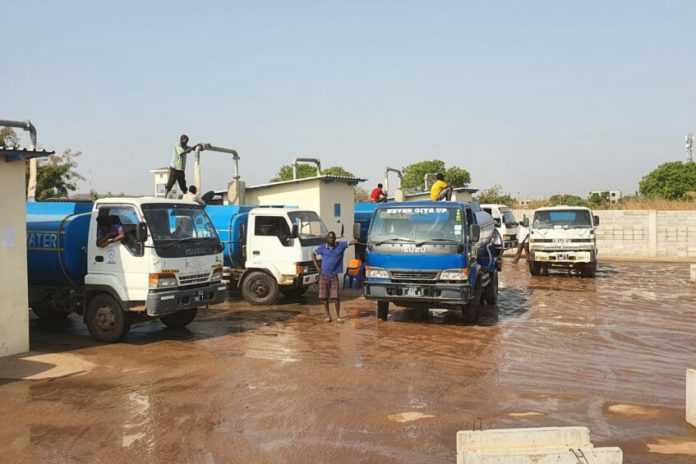By: Sebit Patrick
In light of soaring economic crisis, the cost of living is threatened as prices of goods and service continue to shoot high in South Sudan.
From commodity prices, to the cost of fuel and to transport facilities the expenses have been skyrocketing over a period of one year.
Let’s look at how the cost of water as a necessity of life has transitioned from a relatively affordable resource to a slightly expensive and repressive resource.
Unlike other countries across Africa, in South Sudan water does not run through pipelines but is supplied around the urban suburbs using water tankers, a truck that is predominantly managed by the Eritrean Migrants in the country.
This also means that the migrants control the cost and supply of water across the city while also determining which gets it first and who doesn’t deserve priorities.
A drum of water that costs 1,200 – 1,500 ssp in January 2024, currently stands at 6,000 ssp, a cost that force many households to resort to fetching water from commercial tapes.
In July, a school official in Juba has appealed to the government to take the advantage of River Nile and make safe drinking water affordable to South Sudan population.
Zachariah Malish Raphael, Deputy Head teacher of St. Josephine Bakhita primary school decries the use of tanks, to distribute water in the urban set up.
He called for the need of employ high technology to improve the social service to the people.
“I call also upon our government to prioritize the issue of water; it is really very important. The schools are now facing challenges. Clean water, to get it is a problem, we have river Nile here it is running but to get it now a poor person cannot afford. What can we do? So, we need to reduce the cost of water so that even the poor should get so we don’t put water expensive. I wish those who are responsible are there, water should not be charged expensively” wails Zachariah
In August 28th, Hon. Khalil Abdallah Adam, a Member of Parliament representing Rajaf County raised a point of information, citing the cost of water has risen to 6,000 ssp per drum.
Khalil says the urban water charges the water tankers ssp 500 per barrel and adds that it costs 1 liter to drive to Gudele and Lemon-Gaba totaling to roughly 27,000 ssp.
He however expressed dissatisfaction with the 6,000 ssp charges, which according to him reaps over 200 thousand ssp.
“From the urban water, a barrel of water cost 500 ssp; a tanker carries 30 barrels and the cost of fuel is 5 or 6 thousand can go from Seventh Day to Gudele or Lemon-Gaba with one liter and return with 1 liter which costs 12,000. If you add to 15 thousand from the 30 barrels it will make 27,000 ssp. That is supposed to be the total expense including the cost of fuel and barrels of water.” Khalil told the August house
The parliamentarian called for immediate motion to address the skyrocketing cost of water in the city.
Khalil was backed up by Hon. Gat-Kuoth Wat, an MP representing Jonglei State’s Ayod County who blamed the hiking to individuals within the Urban Water Corporation.
Hon. Gat-kuoth said individuals within the corporation collect water for individuals instead of the government.
He urged for the regulation of the prices of water in Juba.
“Some people within the Urban Water have contracted their individual companies, and these companies are collecting money for themselves not for the government. And I have the details of these companies within all these stations in juba, that have been contracted by people within the urban water corporation and they are collecting water for the individuals not for the government. Number two I think it is important that the city council, together with the ministry of water should regulate the prices of water in Juba.” Gat-kuoth adds
This prompted the assembly to summon the governor of Central Equatoria among other state officials to the legislature to account for the growing cost.
11th September, the Juba City Council imposed new and reduced price for drinking water, lowering the cost from 5,000 to 2,500 SSP within Juba and 3,500 in the suburbs.
The decision came following a meeting with key stakeholders in Water distribution.
The Juba City Council instructed local law enforcement agencies to monitor and enforce the new water pricing structure.
The Mayor of the City explained that the previous surge in water prices from ssp200 to ssp5,000 SSP was a direct result of the ongoing economic crisis, financial inflation, and increased prices of petroleum products.
Johnson Swaka says the city has 120 kiosks where citizens can access water, at affordable prices.
” We sat in a meeting with the city water officials, the Cities Water Authority and the Water Tanker Drivers Association. We have about 120 kiosks for distributing water in the city, where a citizen can fill a jerrycan for 60 pounds and a barrel for 600 pounds. We have 10 stations for filling the tankers with water, and this is under the responsibility of the Cities Water Authority, and a barrel is sold for 600 pounds.” Said Swaka
The authorities have instructed local law enforcement agencies to monitor and enforce the new pricing structure across the city and its suburbs.
The City Council authorities urge all water Tanker distributors to comply with these new prices.
The city has mandated that security enforce the new pricing regulations.
” According to this calculation, a barrel of water is supposed to be sold in Juba for no more than 2,500 pounds, and in the suburbs for 3,500 pounds. We directed the security forces, the central investigations and the police to implement the order new water prices in Juba” Swaka adds
This move is expected to prevent overpricing and ensure affordable access to water for all residents.
However, some residents in Juba says since the new water price was imposed, the water tankers halted bringing water to their area.
They now lament that it is better for the water tanker driver to bring water with the old price.
“The price of water was not reduced it is still the same and now the water tanker drivers are on strike. If you tell them that the price of water was reduced they say fuel is expensive and the dollar is high, now it is two days without water in the area.”
“We are really suffering because of this issue of water, the mayor imposed a new price but water tanker drivers are now refusing to work so it is better them bring us water with the old price than we stay without water.”
For his part, water tank driver reportedly cited rising cost of fuel, Vehicle maintenance and other expenses as the primary drivers behind the hike in water price.
According to Jovany John if the water tank drivers use the new imposed price it will be a loose to them.
“Believe me, the decision that was made, I think, was not a study because the price of fuel, the price of the water itself, the operation cost, to get traffic on the road and everything that means we will be at loss if we operate at the cost of 2,500 ssp per a drum. Yes, because if you multiply 2,500 by 24 drums, it will give you something like 60,000.” The supplier said.
During his presentation at the National Parliament, the Governor of Central Equatoria empathized the need for the national government to focus on establishing a piped water system.
Augustino Jadalla said that the issue of water services should be understood and treated as a national security issue.
“The issue of water services should be understood and treated as a National security issue. As such it needs to be handled with utmost care, I would also like to suggest on consideration of the following; Focus should be put on establishment of piped water system, there is need for the government to consider water subsidies on fuel and water treatments to reduce the cost of water.” Jadalla clarifies.
after a crackdown on tank drivers controlling and maintaining the high cost of urban water, water tank drivers have halted the supply of water across the city. This has since painted a grim desire by the suppliers to maintain their cost per barrels of water.
How do you think water crisis in Juba should be resolved?





